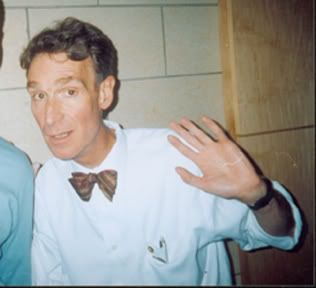
“As a child, I would stand with my father on the beach in Delaware and stare at my shadow as the sun went down, watching it get longer and longer, infinitely long. When you understand how many stars are out there, more stars than there are grains of sand on the beach, you can think you’re just a speck orbiting a speck in the middle of specklessness. But there’s another way to look at it, which is that we have brains, and can use them to understand the universe. And I thought then that if I were out in space I could look back and see my shadow, the long shadow of little Bill.”I grew up two states south of Bill Nye, “The Science Guy,” and I less often considered sand on beaches than water molecules in the ocean, but I did spend many hours contemplating little things, real or imagined, awed by my relative enormity and, in turn, by my relationship to the greater, infinite expanse.
- Bill Nye, The New Yorker “Talk of the Town” (January 5, 2004)
Some professional scientists poo-poo Nye. If pressed, these scientists admit that their disregard is rooted in his popular appeal and his “dumbing down” of science for mass consumption. I prefer to celebrate Nye for the same reasons.
My parents didn’t have a television when I was growing up, but when I visited a neighbor’s house and saw shows like "Sesame Street" or the "Electric Company," I was enthralled. Had “Bill Nye, The Science Guy" been aired when I was young, I'm sure that I would have loved it, and I'm sure that he would have further inflamed my love of science.
Interestingly, underneath Nye’s infectious excitement, he seems complicated. I find myself wondering what he thinks about after the studio lights are turned off. Is he defensively optimistic? Deeply pessimistic? What questions does he ask of himself? Of others? Does he avoid questions of personality or psychology, concentrating instead on that which he can safely externalize?
In the most recent issue of Wired, Nye is featured in "The Science Guy Grows Up," a short, five-question interview. When asked, "Science and comedy seem like strange bedfellows. How do you make serious science funny?," Nye responds:
“How can you make it not funny? Humor is everywhere, in that there’s irony in just about anything a human does. There’s all this PB&J: passion, beauty, and joy. But there’s also the futility of the whole thing. We’re just humans on this dying planet, and it doesn’t much matter what we do. We’re always setting up expectations, whether scientific or otherwise, and failing to meet them. That creates comedic tension. The more you find out about the world, the more opportunities there are to laugh it.”Underneath all of his infectious excitement, then, Nye is something of a nihilist. Perhaps the lessons of science always reduce the human by presenting us relative to the rest of the mess. Maybe this, in part, contributes to the trend towards scientific specialization over generalism, allowing the scientist to avoid looking at the whole and thereby protecting her from potential crackup.
Photo credit: homepage of Zachary Alex Samuels, Cornell University

1 comment:
And those questions should give all of us gas. Um...keep us all gassed up. Hell, you know what I mean.
Ditto.
Post a Comment